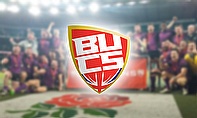Does the North West care about elite rugby?
TalkingRugbyUnion has its base in Lancashire, it’s staff have played for Lancashire and they are currently plying their rugby trade with North west based teams. This affection for rugby union in the north west runs deep.
On Sunday 14th September the TalkingRugbyUnion teams headed down the M62 for the AJ Bell Stadium to cover the Manchester leg of the European Sevens Grand Prix, Day 2.
The event was being covered live by Sky Sports and featured Dewi Morris and Scott Hastings.
The AJ Bell Stadium is in the shadow of the Barton Bridge on the M60 and a stone’s throw from the shopping mecca that is the Trafford Centre. It is a well-constructed and modern sports venue that is the home to Salford Rugby League and Sale Sharks.
Imagine our surprise as we arrived in the ground – where are the crowd? The stadium was empty. It could only have had a maximum of 500 people. We were bound to ask, why so few supporters to watch international sevens. It seems only 8 weeks ago, we were discussing crowds of 171,000 to watch the Commonwealth 7s and over 15,000 watching the London Marriott 7s. What is the difference between London, Glasgow and Manchester? Well on this occasion it wasn’t the weather; it was a glorious September day.
The RFU were out in strength to support the event with Rob Andrew and Bill Beaumont to the fore. The local county board had their team in place and we got to see local mini and junior clubs playing. However, where were the fans?
The European teams do vary in standard but the England team was full of their star players as were the French. The elite final was a contest between these two teams, with England taking the title.
It was the first time we had seen England’s Tom Bowen in action and he scored four tries across the weekend, including one in Sunday evening’s final, as England saw off a resilient French outfit to win 28-21.
France seemed very strong up front but without the pace that England have with Watson and Norton. The French held the lead twice but a strange yellow card early in the second half allowed England to capitalise.
The Plate was taken by Scotland and the Bowl by Portugal. There were other winners; notably Russia and Spain who in finishing 3rd and 4th will have secured funding for next year’s campaigns.
Scotland emerged from the weekend as Plate competition winners, beating Belgium 33-7 in the final.
They recovered well from a disappointing performance against Russia, going on to record an impressive 35-12 victory over Germany before thumping Belgium. The Belgium team appeared to run out of steam. It is interesting to see how Belgium have progressed this year, with their Student 7s team enjoying huge success in Rio. Perhaps it was the same team but they certainly looked like a team who were enjoying the competition, on and off the field.
The RFU reported that Scotland’s skipper, Colin Gregor, felt they came back well despite being knocked out of cup. Their performance in the Plate Final was encouraging. The Welsh flattered to deceive with error ridden games.
The sevens circuit has some top rate Welsh teams competing and it was a huge surprise not to see any of those players making the cut. It is difficult to see how they are overlooked.
It was a great setting with excellent 7s players to be watched, the RFU showed huge commitment; yet there were no fans. In week 1 of the Aviva Premiership, Sale Sharks faced Bath; the attendance was less than 6000. The Rugby World Cup is fast approaching and the many complaints from North West fans that there is only one game, the question must be asked; does the North West care about elite rugby?
Given this conclusion we asked our New Zealand reporter, Scott Donaldson for his views on crowd sizes there. He filed ten reasons for such low supporter turnout:
New Zealand sports crowds are often struggling to break even in the stadiums they play in for rugby and football matches. Here are ten reasons why getting a bumper crowd like we all remember from the good old days is so difficult.
1) Too much sport - There are too many games on. Just look at the Super Rugby season with 125 games over 25 weeks of the year and then there is ITM Cup and All Blacks test matches. It is the same with Hyundai A League where each team plays each other at least twice each season. Each game loses meaning as the novelty of watching it live starts to wear off. This means that people often prioritise and would rather go to the big games like All Blacks test matches rather than spend their money on Super Rugby or ITM Cup games. If you were to attend every home game in the rugby season it would cost you hundreds or thousands of dollars even if you got a stadium membership. Fan fatigue is an issue as it is hard to get motivated to see the same two teams playing again.
2) New Zealand has a population of 4.5 million. We are a small country and so it is sometimes difficult to expect a quarter of a city's population to attend a match. While Auckland is a big city and so it is easier to get a crowd of 30,000 for games there, Dunedin only has about 120,000, so expecting a 30,000 strong crowd for a big game in Dunedin is more difficult. It is simply a numbers game.
3) SKY Television is an investment for people to make. People feel more comfortable being able to watch the game on SKY Television or other online websites and given that investment, people consider watching the game a way of paying off their investment in SKY Television. This is far more convenient and cheaper than going out in the pouring rain and cold rather than watching in the comfort of home. This is especially true for families where getting the kids prepared and going out to the game is so difficult. Let alone the logistics of getting to the game sometimes.
4) It isn't cheap to attend matches these days. Test matches usually cost around $100, while even going to Super Rugby game costs around $30 which doesn't seem that expensive, but for families it adds up especially if you want to attend more than one game. It is expensive being a sports fan. I have personally attended probably around 100 test matches, Super Rugby or ITM Cup games in my lifetime. Given that this includes the Rugby World Cup final in 2011, this means an investment of thousands of dollars. It would be interesting to see some more initiatives around ticket prices. There have been some like $5 entry, but you get the feeling that more people would show up if the prices were lower. It can be a bit of a guessing game for organisers however as there could be other reasons people don't attend, but price is probably a major factor. Should sports stadia try out other ways of selling tickets like airlines use? I think they need really cheap tickets for leftover seats to try and get a decent crowd, although that would only reward the fickle fans who come at the last minute.
It isn't only the ticket prices which are required by the organisers so that they don't run into debt, but if you want to buy food or drinks at the game these are usually expensive, while sometimes getting to the game requires expensive dinner beforehand, car parking or catching public transport. It is also tougher for families with several children.
5) There are bigger tickets in town than attending the rugby these days. The bigger cities especially have more than one events on in town. But there are usually shows on at the theatre, movies on at the cinema, other events like concerts, plays, birthday parties, 21sts, movie premieres... the list goes on. Because people have gone to the rugby before then other events tend to win out if there is a clash of events to attend.
6) Because professionalism means that players have moved around different franchises there is less of a feeling of ownership or an ability to relate to your team. In the good old days you had people playing for their home team in the National Provincial Championship (ITM Cup) and so there was more of a sense of ownership with the team. It is much the same in the USA with college sport where many peole feel more a sense of being able to relate to their college team rather than the NFL or NBA franchise which is based in their city featuring players from all over the country with no relationship to that city. Just look at the Highlanders in Super Rugby 2014, where there were only a handful of Otago and Southland players in their squad with the team simply playing for a team based in the south.
7) There are now other sports and hobbies which are popular with fans and players. Rugby league is huge in Auckland and on the West Coast, while in Wellington there is a massive football following. There are also other sports and hobbies including MMA, X Games and roller derby which are gaining a following with younger audiences as something different from the traditional sports.
8) The rugby laws are so complicated that it has made the rugby the game so confusing, even for the players and referees at all levels. The laws keep changing and rugby especially is a sport that there are so many laws which are open to interpretation. Sometimes the referees’ decisions can decide a match and make rugby boring. There are so many laws in rugby.
9) Rugby is too predictable. Because rugby is so technical it means that there are only a handful of teams that can genuinely threaten for the Rugby World Cup. The All Blacks have an overall winning record of 76 percent and over 80 percent in recent years. The only other teams likely to threaten for the Rugby World Cup are England, France, South Africa and Australia with Wales and Ireland potential bolters. There are less upsets in rugby compared with other sports like football where in the last FIFA World Cup you saw football giants like Spain, Italy and England eliminated in the first round. Look at the ITM Cup, Canterbury has won the last six ITM Cup Premierships, while there are usually only about half of the teams in Super Rugby each season who are a genuine threat.
10) New Zealand sport doesn't do entertainment very well. The cheerleaders are usually average and there are limited competitions, but a recent trip to the USA made me realise how well entertainment can be done with genuinely talented cheerleaders, competitions at most stoppages of play, plenty of opportunities for crowd participation and involvement and some impressive bands and music acts. Generally, New Zealand doesn't have the resources or large market to be able to provide such a large amount of competition prizes or spend too much on entertainment for every single game, but it is something worth looking at. It will be interesting to see how rugby goes in the USA.








